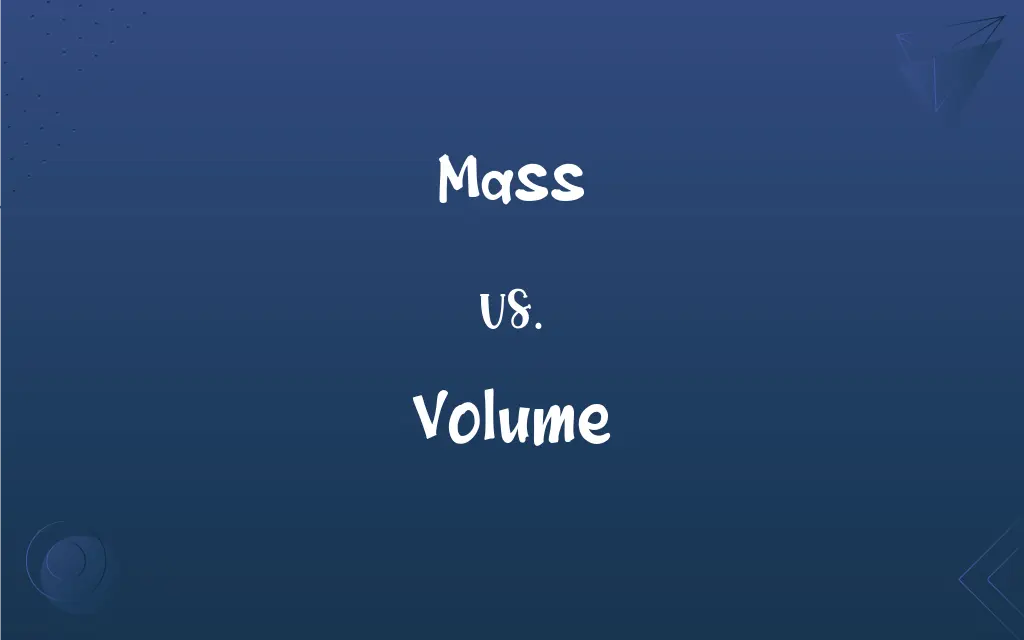Mass vs. Volume: What's the Difference?
Edited by Aimie Carlson || By Harlon Moss || Updated on November 21, 2023
Mass refers to the amount of matter in an object, while volume denotes the space an object occupies.

Key Differences
Mass and volume are fundamental concepts in physics and chemistry, often used to describe the properties of matter. Mass pertains to the amount of matter contained within an object, irrespective of the space it occupies. It's a scalar quantity, meaning it only has magnitude and is typically measured in kilograms or grams. Volume, on the other hand, relates to the amount of space an object takes up, irrespective of the amount of matter it contains. It's a scalar quantity as well, and its units might include liters, cubic meters, or cubic centimeters.
At times, mass and volume can appear interconnected, especially when discussing density. Density is calculated by dividing the mass of an object by its volume. However, it's crucial to note that mass remains constant for an object regardless of its location, whether on Earth, the Moon, or in outer space. Volume, conversely, might change based on conditions, such as when a balloon expands or contracts due to temperature fluctuations.
Furthermore, the instruments used to measure mass and volume are distinct. Mass is measured using balances or scales, ensuring accuracy in determining the amount of matter in an object. Volume, conversely, is determined using tools like graduated cylinders, measuring cups, or by employing mathematical calculations for regular-shaped objects.
In summary, while both mass and volume pertain to the characteristics of matter, they are inherently different. Mass gives insight into the amount of matter in an object, and volume showcases the space an object occupies.
Comparison Chart
Definition
Amount of matter in an object.
Space an object occupies.
ADVERTISEMENT
Scalar/Vector
Scalar (only has magnitude).
Scalar (only has magnitude).
Units
Kilograms, grams, etc.
Liters, cubic meters, cubic centimeters, etc.
Measurement tools
Balances or scales.
Graduated cylinders, measuring cups.
Changes with
Constant regardless of location.
Might change based on conditions.
Mass and Volume Definitions
Mass
Quantity of matter in an object.
The mass of the rock was 5 kilograms.
ADVERTISEMENT
Volume
Loudness or intensity of sound.
She turned up the volume on the radio.
Mass
A measure unaffected by gravity.
The astronaut's mass remained unchanged in space.
Volume
A book forming part of a work or series.
He read the first volume of the trilogy.
Mass
A large body or collection of matter.
A mass of clouds indicated an incoming storm.
Volume
Quantity or power of sound; degree of loudness.
The crowd's volume was deafening after the winning goal.
Mass
The property of matter that determines its resistance to acceleration.
The car's mass affected its acceleration rate.
Volume
The amount of space an object or substance occupies.
The volume of the box is 3 cubic meters.
Mass
The main portion of an object.
The mass of the iceberg was underwater.
Volume
A measure of capacity.
The bottle has a volume of 2 liters.
Mass
Public celebration of the Eucharist in the Roman Catholic Church and some Protestant churches.
Volume
A collection of written or printed sheets bound together; a book.
Mass
The sacrament of the Eucharist.
Volume
One of the books of a work printed and bound in more than one book.
FAQs
Which is affected by gravity, mass or volume?
Weight is affected by gravity, not mass. Volume is unaffected by gravity.
Do mass and volume mean the same thing?
No, mass refers to the amount of matter, while volume is about the space an object occupies.
How is density related to mass and volume?
Density is calculated by dividing mass by volume.
Does the volume of a balloon change with altitude?
Yes, due to changes in atmospheric pressure.
Can mass be converted to energy?
Yes, according to Einstein's E=mc^2.
Does an object's mass change in space?
No, an object's mass remains constant in space.
Are both mass and volume scalar quantities?
Yes, both have magnitude but no direction.
Is volume only related to space?
Primarily, but volume can also refer to loudness of sound.
In which scientific field is volume especially important?
Volume is crucial in fields like chemistry and physics.
How do you measure the mass of an object?
Mass is measured using balances or scales.
How do you measure the volume of a liquid?
Volume can be measured using graduated cylinders or measuring cups.
Can two objects have the same volume but different mass?
Yes, if they're made of different materials with varying densities.
Is mass a measure of inertia?
Yes, mass indicates an object's resistance to acceleration.
Why might the volume of a gas change in a container?
It can change with temperature or pressure.
Can the volume of an object change?
Yes, volume can change based on conditions like temperature.
What's the difference between weight and mass?
Weight is force due to gravity on an object, while mass is the amount of matter.
How is volume related to capacity?
Volume is a measure of capacity, the amount something can hold.
What unit is commonly used for volume in the metric system?
Liters or cubic meters.
Do all objects have mass?
Yes, all matter has mass.
Is mass the same everywhere in the universe?
Mass is a constant property and remains unchanged irrespective of location.
About Author
Written by
Harlon MossHarlon is a seasoned quality moderator and accomplished content writer for Difference Wiki. An alumnus of the prestigious University of California, he earned his degree in Computer Science. Leveraging his academic background, Harlon brings a meticulous and informed perspective to his work, ensuring content accuracy and excellence.
Edited by
Aimie CarlsonAimie Carlson, holding a master's degree in English literature, is a fervent English language enthusiast. She lends her writing talents to Difference Wiki, a prominent website that specializes in comparisons, offering readers insightful analyses that both captivate and inform.






































































